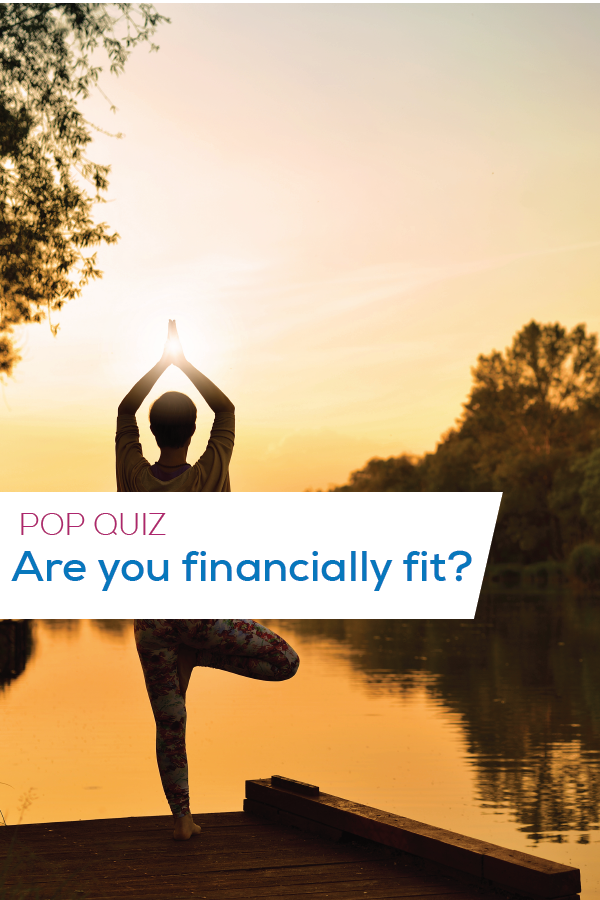Money Smarts Blog
[POP QUIZ] 14 ways to tell if you’re financially healthy
Aug 25, 2016 || Amanda Spurgeon

Financial health means different things to different people, but there are some universal truths. So how do you tell if your finances fit the bill? Read the comments below and see how many you identify with. While each statement doesn’t mean much individually, your finances are probably in good shape if you agree with a majority.
1. You live within your means
You don’t overdraw your account or bounce a check, even if you have overdraft protection. You’ve got enough of a cushion that you aren’t spending down to the last penny every month.
You’re able to save a bit without depriving yourself.
2. Financial stress isn’t keeping you up at night
You have enough in the bank that you’re not plagued by money worries. You know you’ve got enough to cover the bills, and you’re not ducking creditors. You
don’t put off important financial conversations and you’re not just avoiding thinking about the things you can’t handle.
3. You use credit cards out of convenience, not necessity.
Using a credit card out of convenience or rewards and paying it off every month without paying interest is totally fine. Using a credit card because it’s the only way
you can afford to make purchases is problematic and a good sign that you need to revisit your budget or change your spending habits.
4. You’re not worried about losing your job
Not only is your position stable, your finances wouldn’t be completely derailed by losing your job or getting laid off. Yes, you probably need to adjust your budget and change
some spending habits, but you could get by for at least a month (ideally 3) while you look for replacement income.
5. You make payments on time
You’re not wasting money on late fees and penalty APRs. You plan around your due dates and pay on time, or even in advance.
6. You aren’t living paycheck to paycheck
Part of every paycheck goes towards your savings or emergency fund. You aren’t spending down to the last penny every pay period, and you can handle an unplanned for gap in income
(see #4).
7. You save automatically
Some people say to save what you don’t spend, but you know better. You’re only spending what you don’t save. You pay yourself first. All of your money isn’t in your checking
account, and you either set up transfers or have some of your money automatically deposited into savings accounts.
8. You’re not spending money on stupid stuff or to make yourself feel better
You know that retail therapy isn’t actually solving any of your problems and you’re not fooled by all the schemes retailers use to get
you to spend money, like trick lighting and hypnotic music. You aren’t throwing money away on things you don’t need, clothes you won’t wear or already own in two different colors, or services you don’t use (here’s looking
at you, 3000+ channel cable subscription).
9. You don’t panic in the face of a financial emergency
If your furnace broke or your kids hit a baseball through the kitchen window, fixing it wouldn’t put you in dire straits. That’s what your emergency
fund is for.
10. You don’t feel guilty spending on special occasions
Anniversary gift? Birthday party? Night on the town? No problem, within reason. Your budget is flexible and you don’t have to rob Peter to pay Paul (or, skip the
electric bill so you can order a pizza). If the thought of spending a little extra money one month to pay for a gift or dinner out makes you break a sweat, you might want to analyze your spending habits.
11. You’re not worried about other peoples’ opinion of your finances
Keeping up with the Joneses is not your game. You’re comfortable with where you are financially, and don’t feel the need to make big purchases
in order to impress others.
12. Your debt-to-income ratio is below 30%
The lower your debt-to-income ratio the better, but most experts recommend
keeping it at or below 30%. If yours is creeping up higher than you’d like, you either need to pay down your debts or find an additional source of income.
13. You buy assets that appreciate, instead of depreciate
Wealthy people don’t blow large amounts of money on things that quickly lose value, and neither should you. New cars and other fancy toys shouldn’t be a priority. Instead, invest your money wisely or put it towards wealth-building purchases.
14. A large purchase doesn’t deplete your savings
Your budget is fairly consistent month-to-month, but an unexpected or abnormally large purchase doesn’t throw your whole system out of whack. You’ve build a buffer
that allows you to splurge occasionally, for fun or emergencies.
Results:
10 – 15 You’re the picture of financial health. You’ve figured out how to make your finances work for you, and you’re prepared to handle a financial emergency.
5 – 9 You’re on the right track to financial health. You’re living within your means, paying attention to your spending habits and using credit responsibly.
0 – 4 You’re missing that financially healthy glow. Your budget deserves a second look. You might benefit from establishing a flexible budget that accounts for saving for emergencies and spending on fun stuff.

[POP QUIZ] 14 ways to tell if you’re financially healthy
Aug 25, 2016 || Amanda Spurgeon

Financial health means different things to different people, but there are some universal truths. So how do you tell if your finances fit the bill? Read the comments below and see how many you identify with. While each statement doesn’t mean much individually, your finances are probably in good shape if you agree with a majority.
1. You live within your means
You don’t overdraw your account or bounce a check, even if you have overdraft protection. You’ve got enough of a cushion that you aren’t spending down to the last penny every month.
You’re able to save a bit without depriving yourself.
2. Financial stress isn’t keeping you up at night
You have enough in the bank that you’re not plagued by money worries. You know you’ve got enough to cover the bills, and you’re not ducking creditors. You
don’t put off important financial conversations and you’re not just avoiding thinking about the things you can’t handle.
3. You use credit cards out of convenience, not necessity.
Using a credit card out of convenience or rewards and paying it off every month without paying interest is totally fine. Using a credit card because it’s the only way
you can afford to make purchases is problematic and a good sign that you need to revisit your budget or change your spending habits.
4. You’re not worried about losing your job
Not only is your position stable, your finances wouldn’t be completely derailed by losing your job or getting laid off. Yes, you probably need to adjust your budget and change
some spending habits, but you could get by for at least a month (ideally 3) while you look for replacement income.
5. You make payments on time
You’re not wasting money on late fees and penalty APRs. You plan around your due dates and pay on time, or even in advance.
6. You aren’t living paycheck to paycheck
Part of every paycheck goes towards your savings or emergency fund. You aren’t spending down to the last penny every pay period, and you can handle an unplanned for gap in income
(see #4).
7. You save automatically
Some people say to save what you don’t spend, but you know better. You’re only spending what you don’t save. You pay yourself first. All of your money isn’t in your checking
account, and you either set up transfers or have some of your money automatically deposited into savings accounts.
8. You’re not spending money on stupid stuff or to make yourself feel better
You know that retail therapy isn’t actually solving any of your problems and you’re not fooled by all the schemes retailers use to get
you to spend money, like trick lighting and hypnotic music. You aren’t throwing money away on things you don’t need, clothes you won’t wear or already own in two different colors, or services you don’t use (here’s looking
at you, 3000+ channel cable subscription).
9. You don’t panic in the face of a financial emergency
If your furnace broke or your kids hit a baseball through the kitchen window, fixing it wouldn’t put you in dire straits. That’s what your emergency
fund is for.
10. You don’t feel guilty spending on special occasions
Anniversary gift? Birthday party? Night on the town? No problem, within reason. Your budget is flexible and you don’t have to rob Peter to pay Paul (or, skip the
electric bill so you can order a pizza). If the thought of spending a little extra money one month to pay for a gift or dinner out makes you break a sweat, you might want to analyze your spending habits.
11. You’re not worried about other peoples’ opinion of your finances
Keeping up with the Joneses is not your game. You’re comfortable with where you are financially, and don’t feel the need to make big purchases
in order to impress others.
12. Your debt-to-income ratio is below 30%
The lower your debt-to-income ratio the better, but most experts recommend
keeping it at or below 30%. If yours is creeping up higher than you’d like, you either need to pay down your debts or find an additional source of income.
13. You buy assets that appreciate, instead of depreciate
Wealthy people don’t blow large amounts of money on things that quickly lose value, and neither should you. New cars and other fancy toys shouldn’t be a priority. Instead, invest your money wisely or put it towards wealth-building purchases.
14. A large purchase doesn’t deplete your savings
Your budget is fairly consistent month-to-month, but an unexpected or abnormally large purchase doesn’t throw your whole system out of whack. You’ve build a buffer
that allows you to splurge occasionally, for fun or emergencies.
Results:
10 – 15 You’re the picture of financial health. You’ve figured out how to make your finances work for you, and you’re prepared to handle a financial emergency.
5 – 9 You’re on the right track to financial health. You’re living within your means, paying attention to your spending habits and using credit responsibly.
0 – 4 You’re missing that financially healthy glow. Your budget deserves a second look. You might benefit from establishing a flexible budget that accounts for saving for emergencies and spending on fun stuff.
